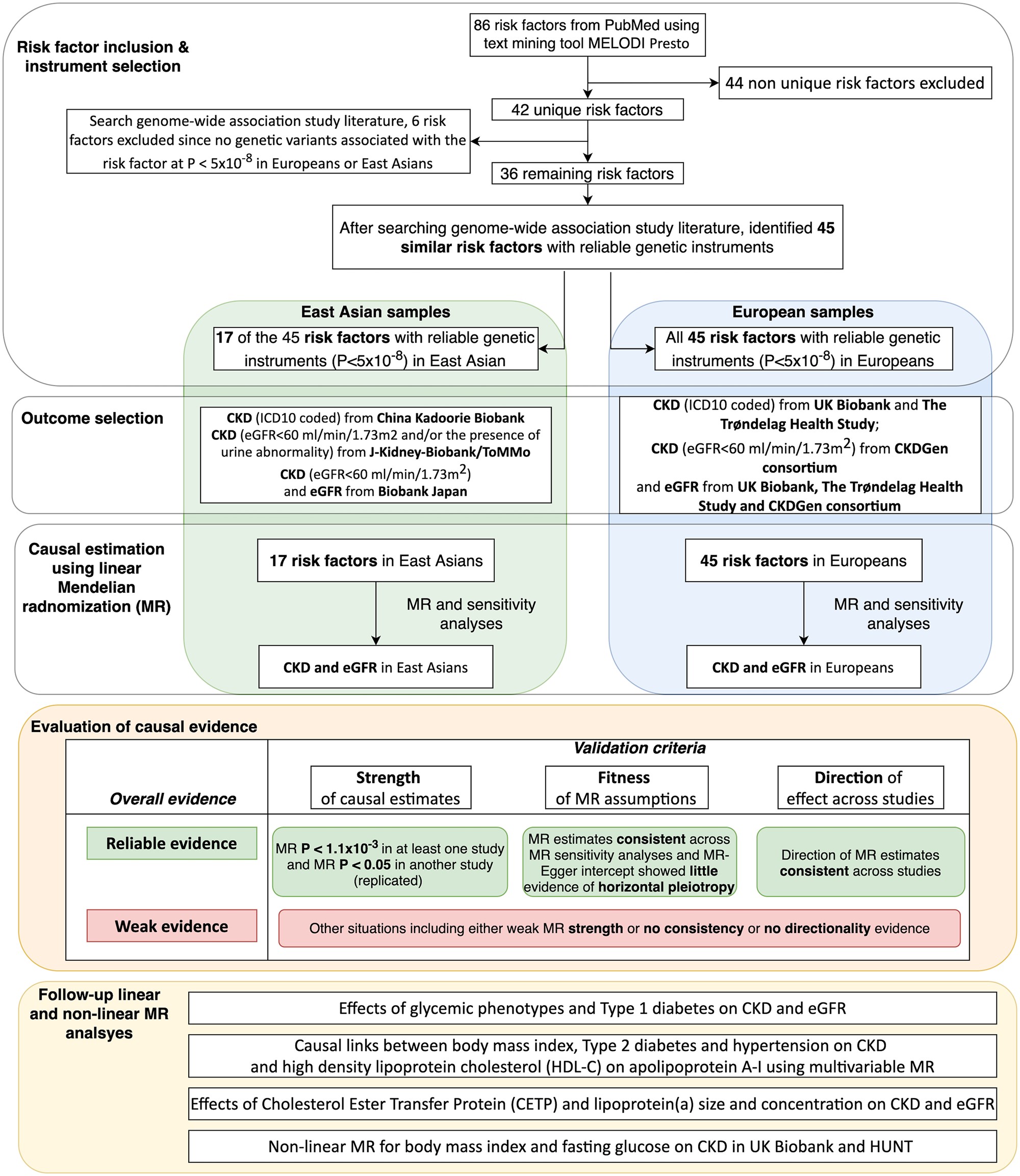Overview
Most Mendelian randomization (MR) studies focus on European populations because of the wealth of genome-wide association study (GWAS) datasets available from European ancestry population samples, in contrast to other populations. However, new GWAS summary datasets from studies such as Biobank Japan, China Kadoorie Biobank and the Japan Kidney Biobank enable us to run ancestry-specific MR analyses to compare causal effects of risk factors across populations. This approach is important in the use of MR to inform public health priorities and interventions in other populations and sub-populations that have historically been under-represented in research.
What we did
In this paper in International Journal of Epidemiology we used MR to estimate the causal effects of 45 risk factors in Europeans and 17 risk factors in East Asians (based on available genetic data)on chronic kidney disease (CKD) (Figure 1). CKD was defined by either clinical diagnosis or estimated glomerular filtration rate (eGFR) of less than 60ml/min per 1.73m2.
In collaboration with an international team of researchers representing a number of different population studies we were able to analyse samples from: * 51,672 CKD cases and 958,102 controls of European ancestry: CKDGen, UK Biobank and HUNT * 13,093 CKD cases and 238,118 controls of East Asian ancestry: Biobank Japan, China Kadoorie Biobank and Japan-Kidney-Biobank/ToMMo
In European ancestry samples we found evidence of causality for: body mass index (BMI), hypertension, systolic blood pressure, high-density lipoprotein cholesterol, apolipoprotein A-I, lipoprotein(a), type 2 diabetes (T2D) and nephrolithiasis.
In East Asians we were only able to analyse a subset of risk factors (due to availability of exposure genetic data for MR), but found evidence of causal effects for: BMI, T2D and nephrolithiasis
Interestingly, in two independent analyses we observed evidence of a causal effect of hypertension on CKD risk in Europeans, but little evidence of an effect in East Asians.
 Figure 1: Study design for the trans-ethnic MR study of CKD.
Figure 1: Study design for the trans-ethnic MR study of CKD.
Paper
‘Trans-ethnic Mendelian-randomization study reveals causal relationships between cardiometabolic factors and chronic kidney disease’ by Jie Zheng, Yuemiao Zhang, Humaira Rasheed, Venexia Walker, Yuka Sugawara, Jiachen Li, Yue Leng, Benjamin Elsworth, Robyn E Wootton, Si Fang, Qian Yang, Stephen Burgess, Philip C Haycock, Maria Carolina Borges, Yoonsu Cho, Rebecca Carnegie, Amy Howell, Jamie Robinson, Laurent F Thomas, Ben Michael Brumpton, Kristian Hveem, Stein Hallan, Nora Franceschini, Andrew P Morris, Anna Köttgen, Cristian Pattaro, Matthias Wuttke, Masayuki Yamamoto, Naoki Kashihara, Masato Akiyama, Masahiro Kanai, Koichi Matsuda, Yoichiro Kamatani, Yukinori Okada, Robin Walters, Iona Y Millwood, Zhengming Chen, George Davey Smith, Sean Barbour, Canqing Yu, Bjorn Olav Asvold, Hong Zhang and Tom R Gaunt in International Journal of Epidemiology (2021).
Data availability
The GWAS summary statistics for CKD and eGFR that were generated using UK Biobank and CKDGen data are available from the MRC-IEU OpenGWAS database https://gwas.mrcieu.ac.uk/ and CKDGen website http://ckdgen.imbi.uni-freiburg.de/, respectively. Other datasets are available on request to the originating study.